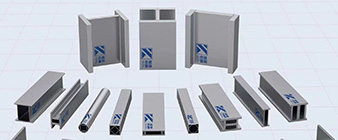904L stainless steel is an excellent choice for hollow structural profiles in water treatment and chemical processing applications due to its excellent corrosion resistance and versatile performance characteristics. The following are the main advantages of using 904L stainless steel to manufacture hollow structural profiles:
The high chromium (19-23%), nickel (23-27%) and molybdenum (4-5%) content in 904L stainless steel provides excellent resistance to a variety of corrosive environments, including seawater, chlorides, acids and various kind of chemical substance.
904L offers excellent resistance to pitting, crevice and stress corrosion cracking, making it ideal for use in water treatment facilities, desalination plants and chemical processing plants.
The corrosion resistance of 904L stainless steel ensures the long-term integrity and durability of hollow structural profiles, minimizing the need for frequent replacement or expensive repairs.
The high nickel and molybdenum content in 904L stainless steel enhances its resistance to a wide range of chemicals, including strong oxidizing acids, reducing acids, and various organic compounds.
This chemical resistance makes 904L hollow structural profiles ideal for equipment, pipes and parts used in the chemical processing industry as well as in water treatment and desalination applications.
904L stainless steel maintains its mechanical properties and corrosion resistance over a wide temperature range, from low temperatures to high temperatures as high as 600°C (1112°F).
This thermal stability is particularly beneficial for water treatment and chemical processing applications that involve temperature fluctuations or exposure to high temperatures, such as in heat exchangers or high-temperature processes.
904L stainless steel can be easily welded using a variety of techniques, including TIG, MIG, and plasma arc welding.
The material’s high ductility and formability make it easy to manufacture, including bending, rolling and machining, to produce a variety of hollow structural profiles with different cross-sectional shapes and sizes.
This manufacturing flexibility enables the design and construction of complex water treatment and chemical treatment structures and components using 904L stainless steel.
904L stainless steel has good mechanical strength, with typical tensile strength of 550 to 750 MPa and yield strength of 220 to 450 MPa.
The material’s ductility and toughness make 904L hollow structural profiles suitable for applications where some degree of mechanical stress or impact is expected, such as piping systems or structural components.
The smooth, non-porous surface of 904L stainless steel, combined with its excellent corrosion resistance, makes it easy to clean and maintain a high level of hygiene.
This property is particularly important in water treatment and chemical processing applications where cleanliness and hygiene are critical.
The combination of superior corrosion resistance, chemical resistance, thermal stability and manufacturing flexibility makes 904L stainless steel an excellent choice for hollow structural profiles in water treatment, chemical processing and other industrial applications requiring high performance and long-term durability. choose.
-
 2024-9-24 S690 Universal Columns Innovative applications in structural works
2024-9-24 S690 Universal Columns Innovative applications in structural works -
 2024-9-25 SMO254 vs. 1.4547 Super Stainless Steel for Structural Applications
2024-9-25 SMO254 vs. 1.4547 Super Stainless Steel for Structural Applications -
 2024-9-16 S32205 VS UNS S31803 stainless steel profiles
2024-9-16 S32205 VS UNS S31803 stainless steel profiles -
 2024-9-16 2205 stainless steel Hollow Sections and H Sections applications
2024-9-16 2205 stainless steel Hollow Sections and H Sections applications -
 2024-9-25 What are the typical applications of Stainless Steel 430/1.4016 structural profiles?
2024-9-25 What are the typical applications of Stainless Steel 430/1.4016 structural profiles? -
 2024-9-24 310S stainless steel performance introduction
2024-9-24 310S stainless steel performance introduction -
 2024-9-20 How does S690 steel improve the seismic performance of structures in building design?
2024-9-20 How does S690 steel improve the seismic performance of structures in building design?



